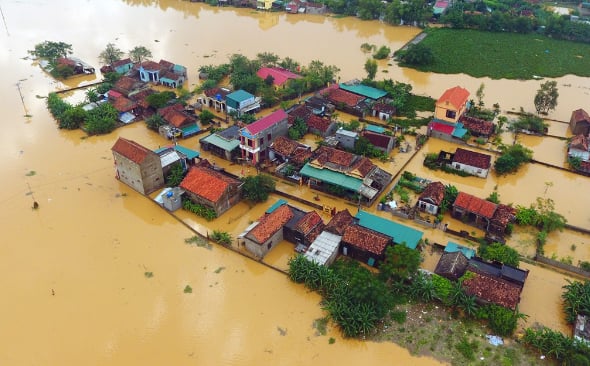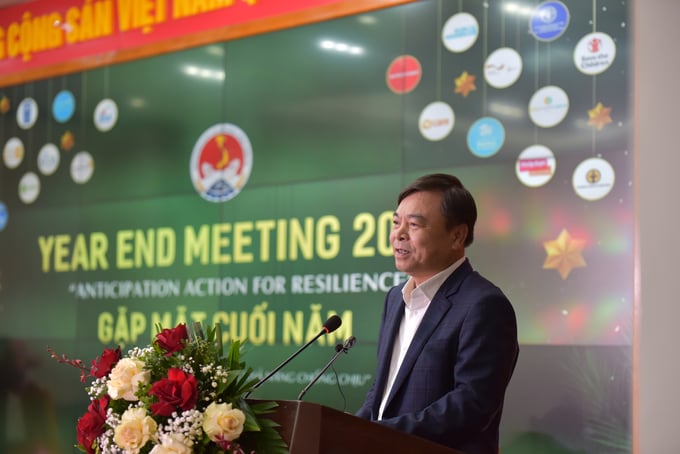May 21, 2025 | 13:22 GMT +7
May 21, 2025 | 13:22 GMT +7
Hotline: 0913.378.918
May 21, 2025 | 13:22 GMT +7
Hotline: 0913.378.918

"Early action to enhance resilience" has been a theme promoted by the United Nations over the past years, aiming to raise awareness among nations in the areas of warning, forecasting, and preparedness for disasters.
During the gathering, delegates collectively reviewed the notable achievements of 2023 and shared the direction of activities for 2024. The Disaster Risk Reduction Partner is an initiative of the Ministry of Agriculture and Rural Development. Over the past four years, with the collective efforts of its members, the partner group has been at the forefront of disaster prevention and response efforts in Vietnam.
This year marks a significant milestone for the Disaster Risk Reduction Partner with the appointment of the new Chairperson, Ms. Pauline Tamesis, serving from October 2023 to October 2026. Ms. Tamesis, the Resident Coordinator of the United Nations in Vietnam, shared during the meeting, "Early action to enhance resilience" has been a theme promoted by the United Nations over the past years, aiming to raise awareness among nations in the areas of warning, forecasting, and preparedness for disasters. Vietnam has actively embraced and implemented the strategic policies of the United Nations in various activities at both central and local levels.
According to Ms. Tamesis, in practice, disaster response efforts have been deployed in affected localities. Within 24 hours, the early action mechanism was activated when the forecasted rainfall exceeded 500mm. As a result, 31 households comprising 1,557 individuals, of which 65% were women, in 7 communes of Thua Thien-Hue province, including the provincial capital, received timely cash assistance. This became a reality thanks to pre-agreed coordination mechanisms among the Directorate of Water Resources, disaster management agencies, local authorities, the Red Cross, and the United Nations.

This year marks a significant milestone for the Disaster Risk Reduction Partner with the appointment of the new Chairperson, Ms. Pauline Tamesis. Photo: Minh Phuc.
"The activation of early action during the flood in Thua Thien-Hue is evidence of the effectiveness of this approach in minimizing the impact of disasters on vulnerable communities," stated a representative of the partner.
Ms. Tamesis emphasized the need for innovative measures to enhance cooperation and effectiveness in disaster response, alongside the early action initiative. Therefore, timely and effective gender-disaggregated data systems are essential to help decision-makers promptly respond to disasters and support vulnerable groups such as children.
Close coordination among partner members, both domestic and international, plays a crucial role in leveraging resources and expertise, contributing to the establishment of a safer future for all citizens in the face of disasters.
Mr. Rémi Nono Womdim, the FAO Representative in Vietnam, presented the report on "Impact of Disasters on Agriculture and Food Security: Avoiding and Minimizing Losses through Investment in Resilience." The report reveals that over the past 30 years, an estimated 3.8 trillion USD worth of crops and livestock have been damaged due to climate and various forms of disasters, equivalent to an average annual loss of 123 billion USD.
Several different solutions exist to limit losses and damages, including strengthening climate finance and early action. In early action, those most vulnerable are often the trailblazers in development, responsible for instigating changes in their own lives and communities.

Deputy Minister Nguyen Hoang Hiep, emphasized that the current unpredictable weather demands more proactive attention and preparedness for the risks of change. Photo: Minh Phuc.
According to Mr. Womdim, FAO's impact analysis demonstrates positive investment returns for short- and long-term early action. For every USD invested in early action before the Noru typhoon in 2023, there is a return of 0.46 USD in the short term (1 year), 1.38 USD in the medium term (3 years), and 4.6 USD in the long term (10 years).
"Based on the positive results of early action at the global, regional, and local levels, FAO remains committed to continuing support for and advocating for this highly effective approach," stated the FAO representative.
Concluding the meeting, the "captain" - the Co-Chair of the Disaster Risk Reduction Partner, Deputy Minister Nguyen Hoang Hiep, emphasized that the current unpredictable weather demands more proactive attention and preparedness for the risks of change. With a consensus that early action against disasters is not only a global orientation or ASEAN's statement on disaster risk reduction but also a future goal for organizations and agencies in the field of disaster prevention and response.
"Each member of the partner, with its resources and organizational strengths, will journey together with the affected communities, taking the most proactive stance possible in the face of disaster events," expressed the leadership of the Ministry of Agriculture and Rural Development with confidence.
Translated by Dieu Linh

(VAN) In 2024, over 295 million people across 53 countries and territories faced acute hunger—an increase of almost 14 million people compared to 2023, while the number of people facing catastrophic levels of hunger reached a record high.

(VAN) World Environment Day 2025 (June 5) carries the theme 'Beat Plastic Pollution' continuing to emphasize the global urgency of addressing the plastic waste crisis.

(VAN) This was the assessment shared by experts at the workshop titled 'Assessing the Role and Potential of Low-Emission Rice Production Systems in Vietnam,' held on the morning of May 19.

(VAN) Cai Rong Port is the fisheries control center of Quang Ninh, helping to monitor fishing vessels, combat IUU fishing, and remove the EC's 'yellow card'.

(VAN) The German Agricultural Society (DLG) explores the possibility of establishing a mechanization service center in Vietnam’s Mekong Delta to support farmers in accessing and utilizing advanced machinery.

(VAN) On May 16, the Department of Water Resources Management, in collaboration with the Food and Agriculture Organization of the United Nations (FAO), held a signing ceremony for the GEF-8 project document.

(VAN) Food safety, mechanization, vocational training, and market opening are key areas of cooperation expected between the Vietnamese Government and the Federal Republic of Germany.